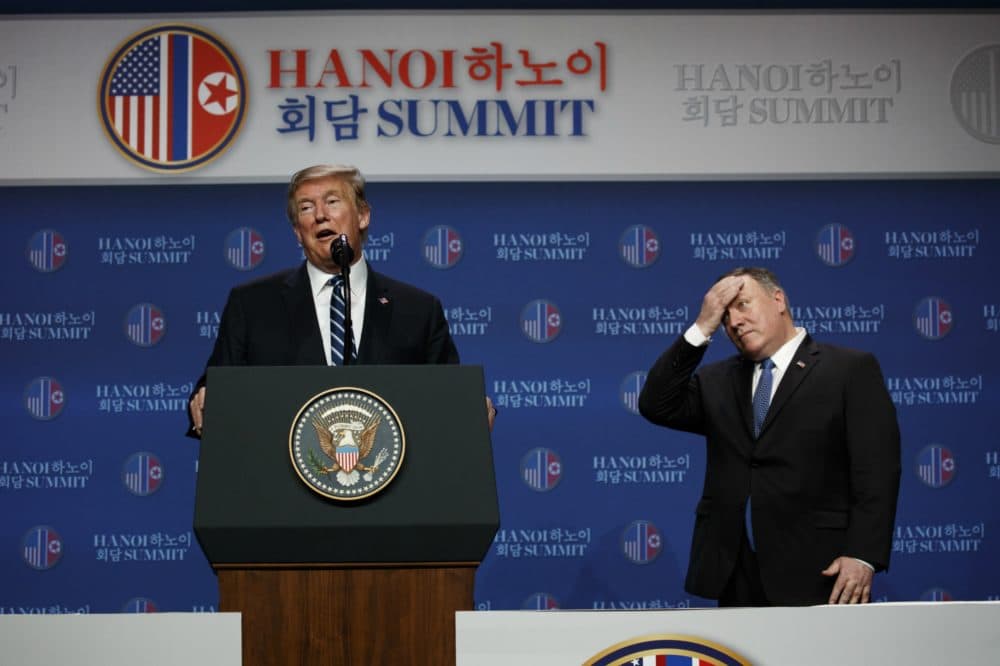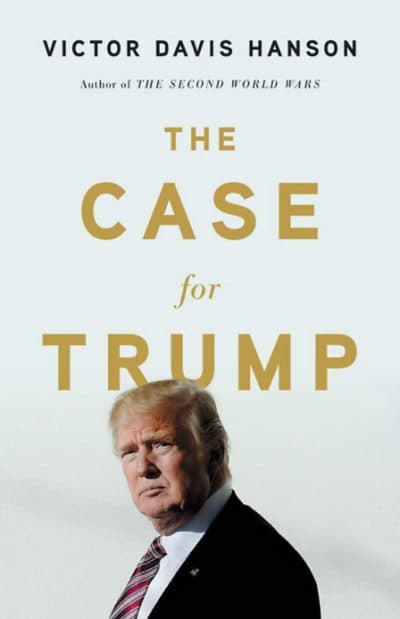Advertisement
Commentary
The Case Against 'The Case For Trump'

You heard it here first: Victor Davis Hanson will win this year’s award for most attention-grabbing book title. “The Case for Trump” ranks up there with “The Ethical Wisdom of Al Capone,” distinguished all the more by Hanson’s oxymoronic status as a pro-Trump intellectual.
An emeritus classics professor (Cal State) and Hoover Institution fellow, he sprinkles his text with allusions to antiquity, as when analogizing Trump’s insistence on lost American greatness to the ancient Greek poet Hesiod’s similar lamentation for his town of Askra. He also pens gray-whiskered rants about Benghazi, Hillary’s crookedness, etc., and some stray, indisputable points. (Trump did benefit in 2016 from political cunning and from the left’s penchant for self-righteousness that smart progressives recognize. And foreign malefactors — North Korea, China, Russia — had misbehaved for years before the Donald beamed onto the political scene.)
But I was eager to see if the book could square two intellectual and moral circles. First, how does the agenda of a man who policy-wise can barely zip his fly provide for the common defense and general welfare? And even if you believe in Trump’s policies, didn’t he long ago reach his Nixon moment, when morally decent believers must withdraw support in the face of the man’s undeniable character cancers?

Hanson’s 372-page brief flunks those challenges by disregarding Atlee’s Axiom.
Mr. Atlee taught us in high school English that any essay hoping to persuade must tackle head-on the other side’s strongest arguments. As in, granted, Trump’s a thug, but [insert superseding point]. Even absolving Hanson for writing before Michael Cohen’s testimony last week, which offered little we didn’t already know, and before Robert Mueller’s forthcoming report, he belly-flops first by ignoring Atlee’s Axiom vis-à-vis Trump’s policymaking.
The president, he writes, inherited failed establishment thinking that demanded a wrecking ball. Besides those overseas problems, Barack Obama presided over anemic economic growth that did nothing to help the “forgotten” white working class, broken and literally dying from opioids, suicide, poor health, and “open borders” through which illegal immigrants poured to compete for jobs. Now we have the Donald, supposedly engineering an economic boom and zealous in defending the southern boundary.
Really? Trump may have goosed some additional defense spending out of NATO, but Hanson ignores evidence that most foreign challenges he cites are either unresolved or in the process of being fumbled. An administration official admitted lack of progress in denuclearizing North Korea; in the case of Iran, Pat Buchanan, the prototype for Trump populism, supported the nukes deal Trump exited.
On the home front, Obama helped the down-and-out with a 2009 stimulus that eased a near-depression and with Obamacare (a conservative reform, not socialism as Hanson brays), “the biggest attack on economic inequality since inequality began rising.” Far from opening borders, the Democratic “deporter-in-chief” contributed to the drop in illegal immigrants here that began before Trump.
Meanwhile, economists left and right explain why the economy is prospering despite, not because of, Trump, whose preoccupation with shredding the safety net confirms the president’s crocodile tears for the needy cascade in proportion to his fibs.
If Hanson merits a D on policy, his handling of the character question is flat-out disingenuous. He doesn’t deny presidential piggishness; if I had a dollar for every variant of the word “crude” in the text, I could buy Mar-a-Lago. To the extent he’s conscious of Trump’s corruption, he finds equivalence or worse in progressive and “deep state” offenses.
Yet on the indictment of the commander-in-chief and his minions for xenophobic racism, Hanson whiffs, saying Trump voters aren’t bigots but victims of “economic discontent and a weariness that the losers of globalization were scapegoated by the winners as responsible for most of America’s supposedly historical pathologies.”
Hmmm. If the book has any mention of birtherism, a purely racist conspiracy movement of which Trump was a charter member, I missed it. Neither does it address Trump followers’ other, numerous, racist fingerprints.
Hanson further skates over the relative affluence of Trump’s voters in the GOP primaries compared with the rest of America, which fact weakens the case for “economic discontent.”
If the book has any mention of birtherism, a purely racist conspiracy movement of which Trump was a charter member, I missed it.
Perhaps personal experience explains the blinkers. He’s admirably candid about living in a California neighborhood plagued by immigrant gangs, and that an illegal immigrant once stole his identity. Hanson believes this gives him real-life experience that progressives in gated zip codes lack.
A less charitable view is that he suffers the political equivalent of shark syndrome. You’re more likely to be killed by a falling vending machine than a shark attack, but try telling that to a survivor of a great white’s bite. Similarly, while you’re more apt to run afoul of native-born criminals than lawbreaking undocumented immigrants, that may not impress a victim of the latter.
Or perhaps Trumpeters’ immunity to ethical disgust confirms columnist David Brooks’s fear that we’ve dumbed down cultural standards:
“Richard Nixon was forced to resign sort of over obstruction of justice. Suppose there’s an obstruction of justice case [against Trump by special counsel Robert Mueller]. Have our norms so changed that that is no longer a political death sentence? And that may have happened.”
